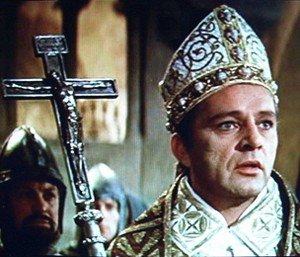By Kenneth Briggs
The Newsworks
March 12, 2011
http://www.newsworks.org/index.php/flexicontent/item/14899-churchcourt-struggle-over-priests-goes-back-centuries/
 |
| Richard Burton as Becket the archbishop of Canterbury in the 1964 film Becket. |
One side benefit of Oscar season is that Turner Classic Movies shows statue winners for a whole month. Among the gems I caught last month was the 1964 shouting-in-the-castle classic, Becket, in which the irrepressible archbishop of Canterbury loses the battle to Henry II but wins the war.
It was timely viewing in light of the cascading reports about sexual offenses by Philadelphia-area Catholic priests. Becket, the archbishop played in the film by Richard Burton, fought to the death to preserve the right to treat priests accused of crimes within the church’s own courts rather than surrender for prosecution under Henry II, played by a fiery Peter O'Toole.
Becket gained sainthood for having been famously murdered in Canterbury cathedral, but Henry got his comeuppance from Pope Alexander who sentenced the cantankerous monarch to a whipping by 80 monks and giving up 200 soldiers for the pope’s next crusade.
Henry also promised to keep royal hands off of priestly criminals. The accused ones rejoiced. Church penalties were much milder than the punishment meted out by the royals.
Nearly a thousand years later, remnants of this centuries-old struggle have emerged during the continuing crisis over sexual abuse of children by priests. Though the modern secular state has been built on the opposite premise, that religion is subject to civil law, medieval assumptions of unchallengeable authority linger.
Time and again church officials have attempted to circumvent civil law by handling the abusers internally. The presumption that crimes of this sort are best left to the church has weakened as the scandal has grown, but recent disclosures of memos from the Vatican to the Belgian and Irish hierarchies make clear that the habit of secrecy persists.
In Becket’s day, the stakes for the church were far higher and often warranted the church’s resistance. Henry wanted nothing less than full control of the church not just its court arrangements. As a young military leader, Becket had befriended Henry but as the archbishop was understandably prepared to defend the church’s independence and supremacy.
Cover-up is an ancient habit
And, of course, it might be argued that Henry’s dictatorial rule made church justice look good by comparison. Given those factors, the church might have been the better practical option while invalid as a fixed principle. Any institution is prone to serve its own interests. Protecting image usually overrules fairness. As the tragic record on abuse shows, cover-up and kid glove treatment are the result, whether in Becket’s time or ours.
Becket’s testiness and his taste for going toe-to-toe with the tormented Henry also smacks of today’s climate. Verbal sparring between church and secular authorities flared from the start. Over time, church authorities have toned down their rhetoric somewhat as they’ve been required to acknowledge the jurisdiction of civil judges and prosecutors.
But attempts to deny the extent or scope of abuse or flat assertions that church officials deserve to decide these matters for themselves continue to be signs of defiance. I refer to the recent dismissive statement by Archbishop Timothy Dolan of New York that his “perception” is that most of the abuse accusations are false.
So the process of detaching civil criminal cases from internal church control has been long in the works and unfinished. The sex abuse scandal has tested that struggle perhaps more than anything since Becket defied Henry. The Vatican now seems more willing to hand over accused clerics because the in-house efforts have largely backfired. My hunch is that if Becket were alive today he’d decide against the in-house crowd and with the arguments in favor of surrendering the accused to the civil authorities.
In the film, Becket yells too loudly and often, but his purpose, to oppose fiercely the usurpation of power, was right. Henry had overdone it. This time I think Becket would have put the onus on Rome.
Kenneth Briggs is former religion writer for the New York Times and author of several books about the Catholic Church. He teaches journalism at Lafayette College.
Any original material on these pages is copyright © BishopAccountability.org 2004. Reproduce freely with attribution.